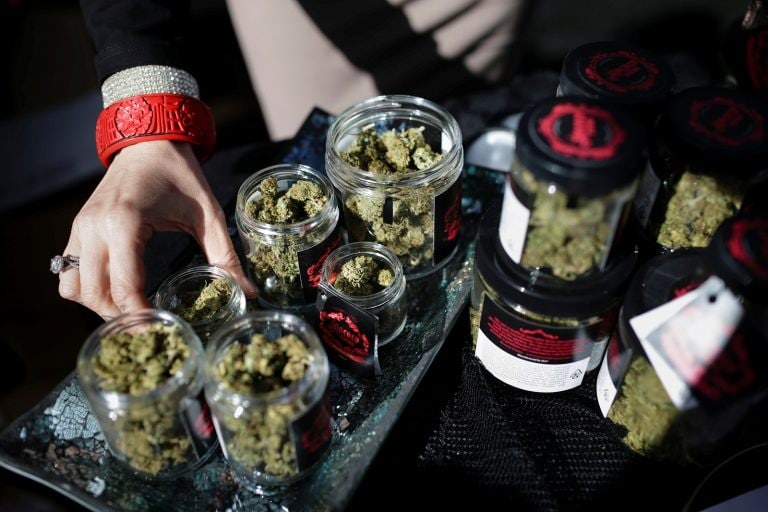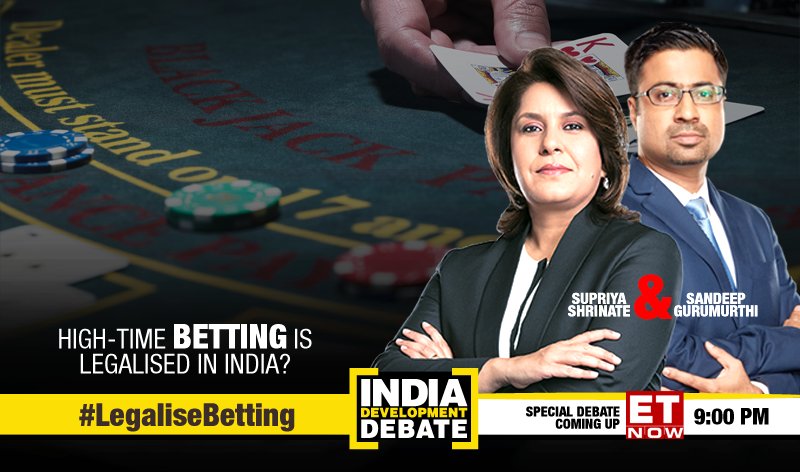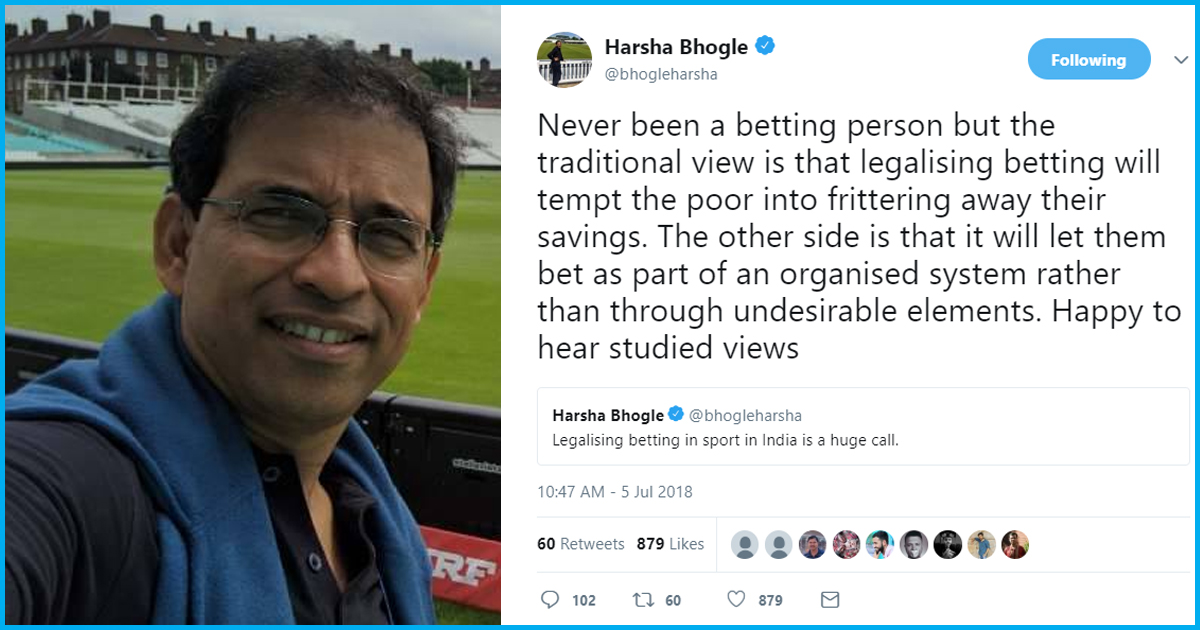Gambling Should Be Legalised In India

Should gambling be legalised?
From the time of Mahabharata to this very day, gambling has been a prevalent practice in Indian society. Gambling was heavily restricted in India by law in the British Era with The Public Gambling Act, 1867.

While the British themselves have now legalized gambling, India remains one of the countries where gambling, though widespread, has neither been able to regulate it or benefit from it.
Hence, the law commission had been asked by the Supreme Court to see if gambling could be legalized in India or not. The Law Commission of India submitted a report in 2018 to the then Law Minister Ravi Shankar Prasad stating that a complete ban on gambling is not working and it is time India overturns outdated laws.
Currently, gambling and betting are legal only in a few places in India such as Goa, Daman, and Sikkim. Now the LCI wants it to be legalized everywhere in India. It has urged that the Parliament should make a law for regulating gambling and betting that may be adopted by the other states. Although gambling and betting is a State subject, the primary law on which States have framed their gambling legislation is an archaic, British-era law called the Public Gambling Act, 1867 and ironically, while India follows a British-era prohibitionist statute, the U.K. Legalised and regulated various forms of gambling and betting many decades.
Around the World

All countries in the world fall into one of three categories, a) Where gambling is legal and regulated, b) Where only online casinos are banned, and some other restrictions are put in place c) Where gambling is illegal. Of course, it is more complicated than that, but this is the broad classification.
Most developed countries fall in the first category. UK, Spain, Greece, and Canada – all collect taxes on gambling. The USA has somewhat liberal gambling laws. Betting on cricket is legal in South Africa. Norway considers it legitimate if done through registered companies.
UAE, North Korea, Japan, and Singapore are some countries where gambling is illegal. India needs to weigh the positives and negatives and come up with a unique gambling law policy which regulates the current system in a way that it does not incentivizes the gambling industry or encourage more people into gambling.
Advantages of Legalizing Gambling
1. Regulation
It has been observed by the Law Committee as well that authorities are not able to stop gambling, and it is happening at a massive range. What cannot be prevented must be regulated and restricted. Gambling, today, occurs with an influence from the underworld and huge black money flows in and out of the system due to this.
Online Gambling has also found multiple users and is flourishing without any regulations. The only way to control and handle this at large is first to recognize that the issue exists instead of denying it. Then, rules can be imposed at various levels, making it not only safer for the people who indulge in gambling but also creating mechanisms to keep crime away from speculating.

2. Revenue
The Gambling Industry today is expected to be worth somewhere around at least $60 billion while reports are suggesting it could be more. Legalizing it would curtail black money and also bring in a source of revenue. Even a conservative estimate indicates that the government can earn tens of thousands of crores in revenue by just legalizing what present and regulating it.
If casinos and online gambling are also included, this increases multifold. This revenue can be used for socially constructive schemes, like in the field of health and education. The simple fact here is that gambling exists. The government recognizing it can not only help in earning more revenue but also in curbing sources of black money and establishing accountability.
3. Economic Opportunities
Other than being a significant source of revenue, gambling can also open up India into a whole new range of economic opportunities. Employment is one such area. Gambling Industry in other countries proves that workers are well paid and with a market as vast as ours, we can generate jobs for a good number of people.

Today, gambling is legal in some parts of the country like Goa. This is also an indication that gambling is an added plus for tourists. When many countries in the developing and developed world are benefiting from the gambling market, there is no reason why India should be left behind. Around 2.5 lakhs and 1 lakh people are employed in the UK and USA in the gambling market respectively.
4. Prevention of nexus between Crime and Gambling
As gambling is illegal in India, the world of crime has completely undertaken its process and control. Gambling shops and casinos have been observed to be places where the drug market flourishes and the crime world operates. Legalizing gambling will help the government control these dangerous activities.
Further, as gambling is illegal, the entire market flourishes on black money which is directed to fund terrorism and other nefarious activities. It acts as a constant market for inflow and outflow of black money. The only way to control and prevent this is to regulate gambling and bring in strict and loophole less legislation to restrict such nexus.
5. Transparency and Safety
There have been multiple cases of people losing livelihood and committing suicide or loss of life due to unchecked gambling in the industry which the authorities have been forced to turn a blind eye too. Further, due to the crime world being so involved in the gambling industry, the safety of multiple individuals who indulge in it has been compromised.
Once legalized, campaigns on excessive gambling can be run, and people can be made aware of its disadvantages. Further, legalizing gambling can bring in transparency and accountability in the sector. Even though these may take time, recognizing and regulating gambling is the first step towards it. It will also prevent cheating and people falling prey to fake and non-authentic gambling houses.
Gambling Should Be Legalised In India 2020
6. Personal Freedom
At the end of the day, gambling does come down to own freedom. It is like eating a burger; it should be a choice for everyone. It should not be banned just because some people cannot control themselves and will excessively feed on junk food. With alcohol and smoking, which is left to personal choice but preventive measures, are taken.
The same should be followed by gambling. Humans are speculative by nature. By making gambling illegal, this natural urge exposes itself and pushes people to the world of crime and gambling when the opportunity arises, as they have no proper knowledge or precautions. Hence, it is better to leave it, people, to choose for themselves and for the state to act as a regulating and educating mechanism.
Concerns Regarding Legalizing Gambling
Gambling has often been accused of being an immoral influence in Indian society. A lot of people have indeed lost their hard-earned money in the intoxication to earn more money. It has definitely also been the cause of breaking families.
Gambling is often described as addictive. Further legalizing gambling is expected to make matters worse.
Many have commented that it will act as a free pass for match-fixers and hamper the integrity of players. Moreover, statistics from Italy shows that gambling has increased 24 times after relaxing regulations. This has led to many arguing that law is the deterrent for most people, and removing that will have disastrous results.
Legalizing gambling might encourage youth to waste precious years of their life in a world where returns are rare and limited. Gambling is often described as “a trap” which can lead successful people to bankruptcy.
Effects of legalizing gambling are expected to affect the lower class the most. They are more vulnerable and likely to be lured into the world of gambling.
Some even argue as to why India is so eager to follow the western world and why laws of the western countries are considered “progressive” when it clearly doesn’t suit Indian values and social structure.
Moreover, questions are raised as to how the already overburdened government and bureaucracy of the country will create and implement effective laws which do not incentivize gamblers and break the nexus between crime and gambling.
Measures India must look into
Creation of a regulatory framework to govern the gambling sector is essential. Gambling can be restricted to only licensed gambling houses and casinos, which will make it simpler to regulate it. Age restrictions can be imposed, and minors can be effectively prevented from entering the market. Limit on how much a person can wager can be created based on income level. PAN and Aadhaar can be linked to these transactions.
Cashless transactions can be encouraged, and limits can be set on a number of transactions to safeguard participants. Foreign Investments in this regard can be encouraged by amending India’s FDI policy. Information Technology act must be amended, and comprehensive laws on online betting can be made. The hardest part will be to find a way to ensure that the connection between the crime world and gambling is broken, and gambling is seen as a source of entertainment only. Awareness campaigns can educate people, students, excessive gamblers, etc. on the effects of gambling.
The current situation
In India, gambling has been prevalent in cockfighting, playing cards, animal street fights and has moved into betting on sports like cricket. Currently, gambling on skill-based activities like rummy or horseracing is legal. It is also legal in select places like Goa and Sikkim. The law commission has now recommended legalizing gambling all over the country. First of all, gambling is a state subject as of now.
Gambling Should Be Legalised In India Today
The center cannot legislate on it. Therefore, either the Rajya Sabha must pass the bill to make it a concurrent subject or the constitution must be amended. The general perception of Indian society towards gambling may deter any political party in power from taking this step as no political party wants to lose its vote bank.
Further, there is a whole debate about whether India has the mechanism and infrastructure to not only make policies on this regard but also effectively regulate and restrict it. If the later is not done, the whole point of legalizing gambling will become useless.